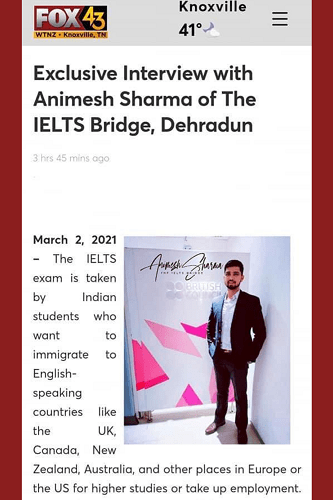The IELTS Bridge is awarded the Best IELTS Institute in Dehradun
#1 IELTS COACHING IN DEHRADUN
Awarded The Best IELTS Coaching Institute in Dehradun
THE IELTS BRIDGE
Best IELTS Institute in Dehradun ! The IELTS Bridge provides 9-9-9-9 bands certified trainers from British Council & University of Cambridge and have proven result records with 8+ bands.
Why are we the best to cater your need?
- The IELTS Bridge is an Authorized Partner of IDP & British Council.
- The IELTS Bridge was awarded ‘The Best IELTS Institute Award in Uttarakhand’ by the Cabinet Minister of Uttarakhand.
- Successfully coached more than 5700 students and counting.
- More than 15k YouTube Subscribers.
- Our founder has authored a book ‘The lazy man’s guide to crack any Interview’ published by Amazon Publishing, USA.
INSTITUTE'S PROFILE VIDEO
Our Services
STUDENT VISA
We provide expert guidance and assistance for student visas to help you study overseas. We have 99.9% visa success rate.

IELTS COACHING
We are considered the #1 IELTS coaching institute in Dehradun and we live up to that name. We offer both offline and online classes.

SPOKEN ENGLISH
Our Spoken English course will help you grow professionally and personally. The program has delivered phenomenal results
Our Core Strengths
Know Your Trainer Animesh Sharma

Know Your Trainer Animesh Sharma
- TESOL & TEFL Certified.
- Certified Trainer of PTE from Pearson India.
- He is a certified IELTS Trainer from British Council and University of Cambridge.
- Global Certifications from University of Edinburg, Maryland University, Georgia Institute of Technology and Berlin Management Institute.
- Authored a book “The lazy man’s guide” to crack any interview, published by Amazon publishing, USA.
- Speaker at two International Conferences in Singapore & New Delhi.
OUR RECENT RESULTS




























OUR VISA SERVICES
RECENT VISAS

















BOOK FREE DEMO !!
AWARDS & WINNINGS






FREQUENTLY ASKED QUESTIONS
The validity of an IELTS Test Report Form (TRF) is two years.
There are two main versions of the IELTS exam: the Academic and the General Training versions. The English language proficiency required for academic settings—often a prerequisite for university admissions—is evaluated by the Academic test. It assesses competencies necessary for advanced study and professional registration. On the other hand, the General Training module concentrates on employing language skills in real-world situations, typically for work experience, immigration, or training courses. While listening, reading, writing, and speaking are all covered in both modules, there are some slight differences in the content and tasks due to the different contexts and goals for which each person takes the exam.
Depending on your objectives, you can choose between IELTS Academic and General Training. If you’re looking to apply to universities for higher education or to register as a professional in an English-speaking setting, choose the Academic module. It assesses proficiency in academic writing. On the other hand, the General Training module, which focuses on everyday language skills, might be more appropriate if you’re migrating for work experience, training programs, or secondary school applications. Evaluate your goals: Academic for educational goals, General Training for immigration or employment-related objectives. Consider the prerequisites of the schools or organizations you’re applying to, as they frequently state which IELTS test formats are acceptable.
Anytime at all, a candidate may retake the IELTS exam.
It is not advised that applicants under the age of 16 take the IELTS exam. They are free to take the test, though, if they so choose.
On the same day, the listening, reading, and writing portions should all be finished. The speaking session may be scheduled for the day of the test or three days in advance or later.
For the reading and listening portions, the candidate may choose to use an HB pencil or a pen.
It is possible for IELTS test takers to view their results online. The official IELTS website offers a safe online gateway for results access. After the test, candidates receive an access code and login to view their results. Viewing of the results is possible on the designated release date.
IELTS tutoring, whether in-person or online, has several advantages. In-person communication, prompt clarification of questions, and a disciplined learning environment that promotes concentration are all benefits of offline coaching. It works for people who learn best in physical classroom environments and prefer in-person instruction. On the other hand, those with hectic schedules or those who live far away can benefit from online coaching since it offers flexibility, convenience, and access to a large variety of study materials. It enables self-paced study, individualized instruction, and frequently provides live sessions or discussion boards for interaction. The decision between the two is influenced by individual preferences, learning preferences, and the time and resources available for each coaching modality.
An in-person interview is used in the IELTS Speaking test to evaluate a candidate’s spoken English ability. It assesses three different types of communication skills. A quick introduction and a general discussion of well-known subjects comprise Part 1. Part 2 consists of a brief preparation period before a two-minute speech on a predetermined topic and a discussion that follows. In Part 3, the subject covered in Part 2 is further explored, with an emphasis on opinions and abstract concepts, as well as a longer discussion. In order to evaluate the candidate’s spoken English skills, the examiner measures the following during the 11–14 minute interaction: fluency, vocabulary range, grammar accuracy, pronunciation, and coherence.
IELTS test results are normally accessible 13 calendar days following the test date. The results are available online and are published on the thirteenth day at midnight GMT. Physical test report forms can be picked up or mailed out earlier by certain testing facilities, but online access is still accessible at the designated time.
Within six weeks of the test date, you have the option to request an Enquiry on Results (EOR) if you’re not happy with your IELTS results. Senior examiners reevaluate as part of this process. If you would like one or more sections remarked, there is a fee involved, which will be reimbursed in the event that your scores change. Keep in mind that EOR may cause a score to change or stay the same. Before choosing to reevaluate, it’s crucial to consider the possible outcomes, weigh your options, and comprehend the risks.
The test center’s policies will determine whether to postpone or cancel an IELTS application. Although this varies by center, you can typically request a postponement or cancellation up to five weeks prior to the test date. Refunds may be partial or subject to administrative fees; there may be a fee. Refunds for late cancellations or postponements are frequently denied. If you need to reschedule, get in touch with the test center right away as space for new dates may be limited. Make sure you read the exact terms and conditions that the testing facility specifies during registration regarding refunds, postponements, and cancellations.
You have to notify the test center as soon as possible, ideally before the scheduled test date, if you will be unable to take the IELTS test because of illness or an unanticipated event. Certain testing centers may take these kinds of situations into account as exceptional cases and grant a test date transfer. Nevertheless, the testing facility has the final say on this and may ask for supporting documentation, such as a medical certificate. It is unlikely to receive a refund or transfer without prior notice or valid documentation; additionally, the test fee may be forfeited. Make quick contact with the testing facility to learn about your options and their policies regarding similar circumstances.
On the day of your IELTS exam, let the test center know right away if there are any uncontrollable or unexpected circumstances that are causing a delay. The center may decide to let someone arrive late for the test, depending on the situation and their policies. But the test center has the final say on this, and it may depend on factors like availability and how it will affect other test takers. A late entry may not be allowed and the test fee may be forfeited without prior notice or good cause. Try to find solutions as soon as possible, but always communicate clearly and back up your claims with evidence or good reasons.
For some people, structured guidance, practice, and familiarization with the test format can be obtained through IELTS coaching. However, depending on a person’s learning style, proficiency level, and resource availability, it may not always be necessary. Success can also be achieved through independent study using official IELTS materials, internet resources, and practice exams. While coaching can improve tactics, time management, and language proficiency, practice on a regular basis and personal commitment are essential. While some candidates might benefit from formal coaching, others may excel without it if they have a strong foundation in language. In the end, the choice is based on the individual’s comfort level, level of language proficiency, and desire for either independent or structured study.














